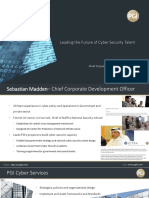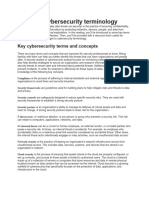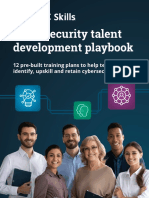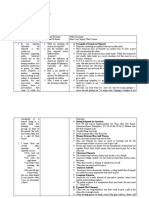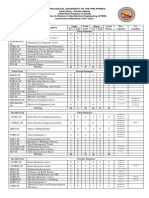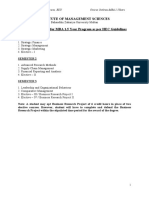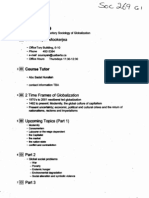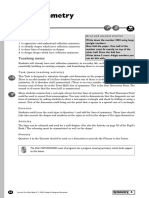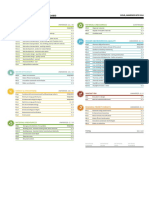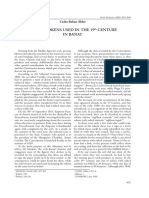Cybersecurity Fundamentals
Completed!
15 MINUTES
Core attributes and skills
According to ISACA’s State of Cybersecurity 2019 Report (http://www.isaca.org/About-ISACA/Press-room/News-Releases/2019/Pages/ISACA-State-of-Cybersecurity-
2019-Survey.aspx), 69 percent of companies reported having understaffed cybersecurity teams. The short supply of qualified cybersecurity professionals has led to unfilled
positions and a widening work skills gap. You might be wondering what skills you need to face down security threats. If you like a challenge and solving hard problems, then
this could be a great area of work for you. Let's explore the typical personal characteristics and skills you need to succeed in cybersecurity.
What skills should new cybersecurity professionals focus on? No matter the educational background of the professional, there are some essential elements. These elements
can be classified into two groups: core attributes and skills.
• Core attributes can be considered a general disposition beneficial to security professionals — a set of common personality traits and learned behaviors.
• Skills include both technical and workplace-related abilities.
A new security professional may not have all these skills at first, but focusing on them over time will provide greater career path flexibility and the foundation for technical or
business-focused leadership positions.
This table shows the core attributes and skills cybersecurity professionals should have. Does this sound like you? Take a moment to please review.
�Source: It’s not where you start – it’s how you finish: Addressing the cybersecurity skills gap with a new collar approach (https://securityintelligence.com/events/its-not-
where-you-start-its-how-you-finish-addressing-the-cybersecurity-skills-gap-with-a-new-collar-approach/?
mhsrc=ibmsearch_a&mhq=It%E2%80%99s%20not%20where%20you%20start%20%E2%80%93%20it%E2%80%99s%20how%20you%20finish&_ga=2.227931483.79
212941991.1614793349), IBM Institute for Business Value, 2017
What do you think?
Here are some questions to think about. Please type your answer to each question in the boxes. Reflecting and typing an answer is a good way to process your thoughts.
Your answers are just for you and are only saved in this course for you. Be sure to click Save Text.
In terms of core attributes:
• Are you an Explorer who is investigative in nature and enjoys challenges? Do you like that every day is different and presents new challenges, versus following routines?
• Are you a Problem solver who is detailed oriented and methodical in your thinking?
• Are you a Student who is a lifetime learner and can stay on top of the latest developments, threats, and trends in cybersecurity? Are you good at building up a network of
contacts to have your own community of knowledge (e.g., colleagues, conference participants).
• Are you a Guardian who is protective and reliable? Do you want to uphold your reputation and that of your company so you are not the one who let the threat "get by you"?
• Are you a Consultant in nature who is a team player and wants to work to solve business problems?
1. Think about your core attributes. What core attributes do you have today and what core attributes would you want to work on developing?
Save Text
In terms of skills:
• Are you an Explorer who could understand scenarios, risks, and "what if's"?
• Are you a Problem solver who could gains skills in coding, figure out how things are built, and get some hands-on experience and/or certifications?
• Are you a Student who could grow your cybersecurity industry knowledge and adapt to emerging security technologies?
• Are you a Guardian who could become more acquainted and knowledgeable about laws and regulations to uphold?
•
�•
Are you a Consultant who could effectively communicate complex, technical concepts and work with diverse teams?
2. Think about your skills. What skills do you have today and what skills would you want to work on developing?
Save Text
Skill areas to build
Cybersecurity professionals have a diverse set of backgrounds, some of them in the IT field and some from totally different fields. The key is to build up a set of relevant
technical skills and workplace-related abilities that can give you the basics you need to launch into a cybersecurity role. Here are some skill areas to consider. This is not an
exhaustive list, but it covers the foundational skills to think about.
Skill area Description
System For Linux, UNIX, and/or Windows operating systems, you need to know the basics of
administration installing, configuring, and maintaining client and server systems. You need to
understand the underlying models for user management, permissions, file systems, and
command scripts.
Network You need to understand protocols such as TCP/IP, FTP, and SMTP. In particular, you need
administration to know what they mean and how they're used at a practical, hands-on level.
Customer You need the ability to interact with clients to help them through diagnosing and
service remediating security issues.
Communications You need the ability to succinctly communicate, using verbal and written
communications, technical information about security incidents and remediation of these
incidents.
Aptitude for You need the curiosity and mindset for detecting and probing into unusual behavior. This
investigation can be demonstrated through experience in troubleshooting IT issues or in a totally
different field such as military intelligence. The key is to demonstrate the initiative to do
the requisite detective work to get to the bottom of suspicious situations.
Someone who works in cybersecurity should be inventive and able to come up with solutions quickly to stop breaches from becoming massive problems for an organization.
Remember, thinking creatively is probably how the cyber attackers got in. A cybersecurity professional must be just as creative to realize how they got inside the system.
Overall, you can see having key technical skills, being a critical thinker, interacting with people, and having a "detective mindset" can help you succeed.



















